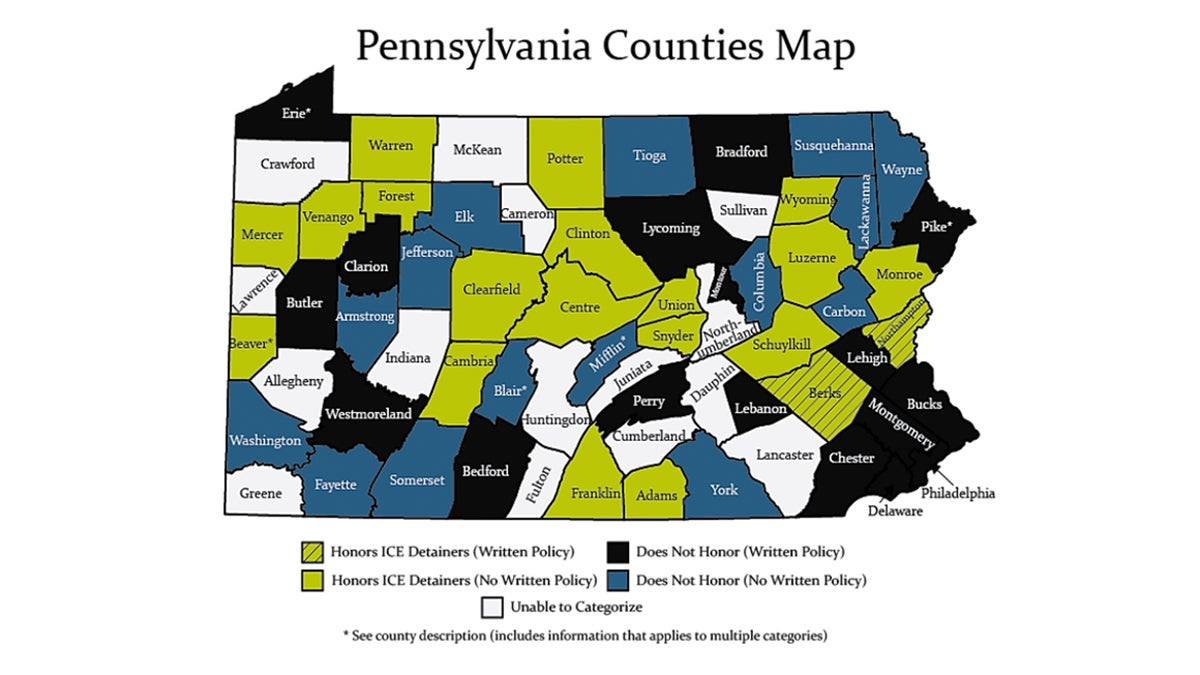Bill would make counties cooperate with immigration detainers

Since this map was published, Allegheny County has instituted a written policy to not honor ICE detainers. (Map courtesy of Temple University Beasley School of Law and Sheller Center for Social Justice)
Cities that refuse ICE requests are often referred to as “sanctuary cities.” But legislators are considering a law that would withhold funds from any municipalities that don’t cooperate.
The federal Immigration and Customs Enforcement (ICE) agency often requests that cities and counties hold suspected illegal immigrants in custody for up to 48 hours so ICE can investigate immigration status or pick them up for deportation.
Cities that refuse are often referred to as “sanctuary cities.” But legislators in Harrisburg are considering a law that would withhold state law enforcement funds from any municipalities that don’t cooperate with these requests from ICE.
These “municipalities of refuge” could be cities, boroughs, townships or counties.
To detain, or not to detain
In Pennsylvania, 17 out of the 67 counties have explicit policies to not honor ICE detainers, according to a study by the Temple University Beasley School of Law and the Sheller Center for Social Justice. Another 15 have no written policy, but don’t honor ICE detainers.
Only two have written policies to honor ICE detainers: Northampton and Berks Counties. Berks policy says it will only hold suspects for four hours, not the requested 48. (Eighteen counties have unwritten policies to honor ICE detainers, four don’t have county jail facilities and 11 didn’t provide information.)
Why don’t a majority of Pa. counties cooperate with federal immigration officials?
It’s not necessarily out of compassion for illegal immigrants.
In 2011, Angelica Davila was pulled over in Allegheny County, according to a lawsuit filed by Davila and the ACLU of Pennsylvania. Davila was born in Mexico but has lived legally in the U.S. since she was two years old. Despite her legal status, ICE issued a detainer for Davila.
She spent the night in the Allegheny County jail. After her release, she sued the local police, ICE…and Allegheny County. The county ended up settling for $25,000 and agreed to stop honoring ICE detainer requests without the approval of a judge.
“It’s a smart move when a county is assessing risk,” says Sundrop Carter, executive director of the Pennsylvania Immigration and Citizenship Coalition. “These aren’t counties that are rolling in money, that can afford to send off a lawsuit or pay a settlement if they end up holding someone for ICE when ICE has no legal basis.”
Often, these counties still notify ICE when they have a possible illegal immigrant in custody, even warning ICE when that person is going to be released.
“There is no such thing as a city that has said to ICE, ‘you can’t come into our city and deport people,'” says Carter. “ICE can still stand outside the door and the second they’re released, take them and deport them.”
ICE detainers are usually issued by ICE officers, not a judge. They don’t come with a warrant, leaving counties vulnerable to legal action. Also, holding people in prison for 48 hours can be expensive and take up limited bed space. Some counties have said they don’t get reimbursed at fair rates.
The case of Philadelphia
In April 2014, Mayor Michael Nutter signed a law that said Philadelphia would not honor ICE detainers unless the illegal immigrant had committed a first or second degree felony — and the ICE agent got a warrant from a judge.
But in November, Nutter’s office informed immigration advocates that he was considering repealing or changing aspects of that policy. The Department of Homeland Security, which oversees ICE, has been encouraging cities, including Philadelphia, to start the Priority Enforcement Program (PEP) —a way of identifying and detaining illegal immigrants who pose a threat to national security.
Deputy Mayor Everett Gillison told Philly.com, “If a person is suspected of being a terrorist, and they happen to be in our custody, are you telling me that we don’t want to tell the feds?”
He says they are working on finding a compromise between the initial order and the new requirements under PEP. Mayor-elect Jim Kenney has promised to reinstate Philadelphia’s status as a sanctuary city if Nutter’s changes go through.
Sanctuary no more
There have been attempts to limit sanctuary cities on a national level, most recently this summer after a young woman was murdered in San Francisco by an illegal immigrant. San Francisco is a sanctuary city, and many felt the murder wouldn’t have happened if the city had turned the recently-arrested immigrant over to ICE.
Pennsylvania’s own GOP Congressman Lou Barletta was the one that introduced the national legislation, which would stop all federal funding to local governments that failed to honor ICE detainers.
The federal legislation failed when it was blocked by Democrats in Congress. So now, the issue is playing out on a state level: North Carolina became the first state to ban sanctuary cities in November. Texas and Pennsylvania are considering similar legislation.
Here in Pennsylvania, SB977 is sponsored by Senator Richard Alloway, a Republican.
Alloway did not return request for comment, but he spoke to WITF in August. “Our federal government needs to continue to have the discussion of immigration and our laws and how it needs to be handled. But that is a federal issue. At the state level, the least we can do is offer these people up when they commit crimes.”
The bill is in front of the Senate Appropriations Committee. Whether or not it passes, immigration advocates are worried about the mood it indicates.
“This makes immigrant and refugee communities feel unwelcome,” says Carter. “On top of the hateful rhetoric at the national level, these sort of local bills make them fear becoming targets in the community.”
WHYY is your source for fact-based, in-depth journalism and information. As a nonprofit organization, we rely on financial support from readers like you. Please give today.


